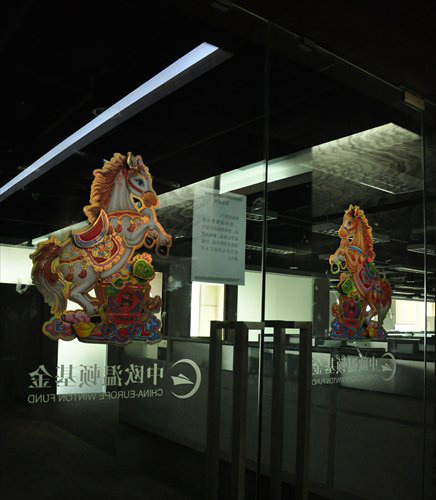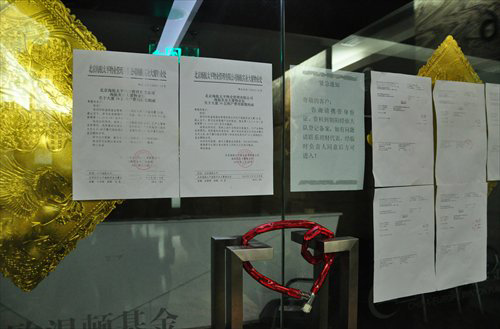 First Russian Street in Tianjin open to public
First Russian Street in Tianjin open to public
 Motorcycle stunt on the Bund
Motorcycle stunt on the Bund
 French Spiderman Alain Robert climbs up Galaxy Hotel in Macao
French Spiderman Alain Robert climbs up Galaxy Hotel in Macao
 Africans in Guangzhou
Africans in Guangzhou
 Pole dancer shows strength and beauty up in the air
Pole dancer shows strength and beauty up in the air
 College girls call for protection of ecological space on earth
College girls call for protection of ecological space on earth
 Top 10 celebrities driving auto brands
Top 10 celebrities driving auto brands
 10 low-carbon tips to save money
10 low-carbon tips to save money
 Luxury cars make Asia premiere at Auto China
Luxury cars make Asia premiere at Auto China
 Versatile dog
Versatile dog
 |
| The closed entrance to China-Europe Winton Fund on Sunday. (GT/Liang Fei) |

Notices from the building management saying that the company has not paid management fees or the rent. (GT/Liang Fei)
News of Li's suicide spread around her neighborhood in the days following her death.
In the small hours of Friday, 51-year-old Li, who lived in Beijing's Chaoyang district, jumped to her death from the 17th floor of the building where she lived.
Some of Li's neighbors thought it was because she had been depressed, but few knew that she was one of the victims of a failed investment.
At the end of 2013, Li invested around 110,000 yuan ($17,600) with a fund management firm named China-Europe Winton Fund. But in February this year, the company's executives were all found to have disappeared.
Li's family was not that rich and the investment would have taken a large chunk of their savings. Li's husband declined an interview request from the Global Times.
China-Europe Winton Fund's office in the central business district (CBD) in Beijing appears to be closed. On the front door, there are notices from the building management saying that the company has not paid management fees or the rent.
At the end of February, a group of investors in the company reported the disappearance of the executives to the police. The police are currently investigating the matter but efforts to reach them failed as of press time.
Well-disguised scam
Founded in July 2012, China-Europe Winton Fund claims on its website that it has offices in major cities including Beijing, Shenzhen and Shanghai. Its main office in Beijing is located in a prime area of the capital's CBD.
In November 2012, China-Europe Winton Fund said it had inked a fund custody deal with Bank of China, one of the country's major commercial banks, to keep investors' money secure.
Bank of China did not reply to the Global Times' interview request as of press time.
The company seemed convincing. "I talked with them several times, and they [the employees] made me feel that it was a legitimate company," Chen Lifu, who invested 1.5 million yuan with the firm in November, told the Global Times on Monday.
Chen, a 59-year-old retiree living in Beijing, said that he heard about China-Europe Winton Fund at a supermarket when the company's employees were handing out fliers.
"Most victims of the company are retirees like me," he said.
China-Europe Winton Fund offers wealth management products and peer to peer (P2P) lending services that match lenders with borrowers.
The company claimed that in each P2P lending deal, the borrower would provide real estate properties as collateral, in order to guarantee the safety of the investment. But Chen said this was just a lie.
Most employees in the company also invested in its wealth and lending products. The scam first came to light in February when several employees reported to the police that they were unable to withdraw their investments.
China-Europe Winton Fund promised a return rate of 12 to 15 percent for its investment products. Chen said that the return rate was reasonable and that is why he made the investment. "If it was too high, I would be suspicious about it," he said.
Around 2,000 investors have lost nearly 400 million yuan from investments with the company, recent media reports said.
Angry investors have offered a 1 million yuan reward for information about the whereabouts of the company's missing CEO, Li Xiaoyong.
Increasing risks
The P2P model has been seen as a financial innovation as it offers a new source of funding for small companies, which usually find it difficult to get funds from the traditional banking system. But the case of China-Europe Winton Fund has again raised concerns about the risks associated with P2P lending.
In 2013, over 600 new online P2P lending platforms emerged, bringing the total number of such platforms to around 800, according to Ma Jun, chief analyst at Shanghai-based wangdaizhijia.com, a Web portal that tracks the online P2P sector.
The fast-growing sector has also drawn the attention of Internet giants. On April 10, Baidu Inc, together with P2P lending firm CreditEase, launched a program to offer interest-free loans to consumers. Last week, Sina Corp also announced it would offer P2P lending products.
The return rate from P2P products is usually higher than that of banks' wealth management products. However, the risks in P2P investment are also alarming - around 100 online P2P lending platforms have reported cases of default or filed for bankruptcy since the beginning of 2013, according to Ma.
Ma said that unlike commercial banks, which have large assets to help them weather capital shortages, "a single default could be a fatal blow to a small P2P platform."
Xiong Yonglin, a lawyer at Sichuan-based Junhe Law Firm, noted that some people are intentionally taking advantage of the sector's loopholes, as there is still relatively little regulation in the sector.
Media reports have said that some of the P2P platforms are operating like a Ponzi scheme - using fresh investment funds to repay old debt.
"If fraud was [the executives'] intention, they will be prepared. So it will be difficult for investors to get their money back, and it will take a long time," Xiong noted.

 Overseas returnees strive for dreams in Beijing
Overseas returnees strive for dreams in Beijing Fried up: Chili pork bonanza in Central China
Fried up: Chili pork bonanza in Central China Hand-painted maps go viral online
Hand-painted maps go viral online 4th Beijing Int'l Film Festival ends
4th Beijing Int'l Film Festival ends Commando elite specializes in sign language
Commando elite specializes in sign language Man photoshops himself into girlfriend's childhood photos
Man photoshops himself into girlfriend's childhood photos Photo story: Stallholders at Beijing Zoo Wholesale Market
Photo story: Stallholders at Beijing Zoo Wholesale Market Artists on backstage
Artists on backstage Beckham launches fund to support youth soccer in China
Beckham launches fund to support youth soccer in China 'African Street' in Guangzhou
'African Street' in Guangzhou Special operation members in comprehensive training
Special operation members in comprehensive training Cute Shaolin boy melts the hearts of millions
Cute Shaolin boy melts the hearts of millions Giant panda Sijia is back to happy life
Giant panda Sijia is back to happy life Richest Chinese of 2014: half from the mainland
Richest Chinese of 2014: half from the mainland Chengdu - laid-back lifestyle makes happiest city
Chengdu - laid-back lifestyle makes happiest cityDay|Week|Month